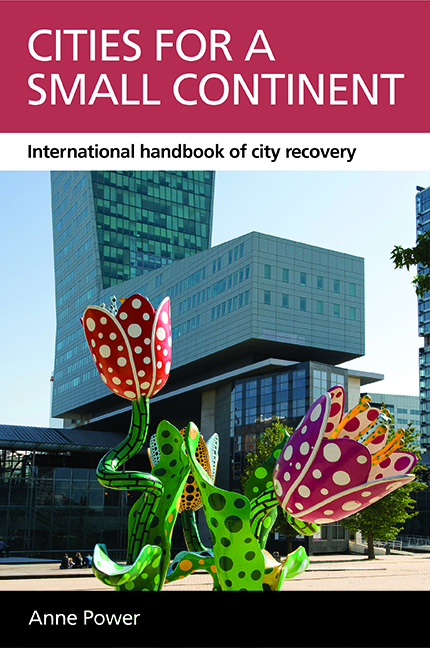Book contents
- Frontmatter
- Contents
- List of tables and figures
- Abbreviations and acronyms
- Acknowledgements
- Copyright material
- Foreword
- one Lessons from cities in a crowded continent Tale of a city – Bilbao
- two Divided and united Europe Tale of a city – Belfast
- three Grit and vision Tale of a city – Sheffield
- four Struggle and strive Tale of a city – Lille
- five Threats and opportunities Tale of a city – St Étienne
- six Over-scale and under-scale Tale of a city – Torino
- seven The power of social innovation Tale of a city – Leipzig
- eight Shoots of growth in older industrial cities in the US Tale of a city – Detroit
- nine Finding new ways out of the woods
- Endnotes
- References
- Afterword
- La Fabrique de la Cité
- Index
one - Lessons from cities in a crowded continent Tale of a city – Bilbao
Published online by Cambridge University Press: 01 September 2022
- Frontmatter
- Contents
- List of tables and figures
- Abbreviations and acronyms
- Acknowledgements
- Copyright material
- Foreword
- one Lessons from cities in a crowded continent Tale of a city – Bilbao
- two Divided and united Europe Tale of a city – Belfast
- three Grit and vision Tale of a city – Sheffield
- four Struggle and strive Tale of a city – Lille
- five Threats and opportunities Tale of a city – St Étienne
- six Over-scale and under-scale Tale of a city – Torino
- seven The power of social innovation Tale of a city – Leipzig
- eight Shoots of growth in older industrial cities in the US Tale of a city – Detroit
- nine Finding new ways out of the woods
- Endnotes
- References
- Afterword
- La Fabrique de la Cité
- Index
Summary
We are the first generation that through its neglect could destroy the relationship between humans and the planet, and perhaps the last generation that can prevent dangerous climate change
Nicholas Stern, Why Are We Waiting? The Logic, Urgency and Promise of Tackling Climate ChangeBox 1.1: Bilbao – a story
The ancient Basque city of Bilbao captures all the dense, compact, crowded variety of Europe's industrial cities. High blocks of flats, old in the centre, newer around the edges, are packed with residents jostling for space. Small shops fit tightly into street-level frontages. Cafes and bars spill out onto narrow pavements. Tourists mingle with local residents. Vascuence, the native tongue of the ancient Basque kingdom, is often heard. When you arrive at the station, you immediately sense the action. Suddenly the river comes into sight, and the wide pavement by the bridge is packed with noisy groups of protesters carrying banners and flags. It is June 2014 and the King of Spain has just abdicated. A new political force – ‘Podemos’, We Can – suddenly emerges.
In 2012, two years earlier, the same pavement by the river housed an impromptu encampment of young ‘indignados’ – the ‘protesters’ – who know they stand little chance of a job under Spain's harsh austerity programme. They demanded action against corrupt officials and a fairer, more open democracy. They became the springboard for this totally new political force in Europe, Podemos, capturing 25% of the regional Spanish vote in 2015.
Yet history and tradition remain strong in the city. Every August, the festival of Bilbao takes place on the same river bank. In August 1995, Bilbao was a gloomy, and occasionally violence-torn city, with few tourists, an idle port, silent steel furnaces. Crowds of locals packed the pavements in the dark evening, waiting for a ceremony that outsiders cannot fathom. An elaborately dressed, out-sized, crowned Virgin Mary hangs on wires over the black water as fireworks go off all around. At the stroke of midnight, the robed statue bursts into flames, lights up the sky and river for seconds, then plunges into the deep. The ceremony still happens each year, challenging visitors and citizens to reconcile the past with the present, out of which a new future for Europe's cities is being carved.
- Type
- Chapter
- Information
- Cities for a Small ContinentInternational Handbook of City Recovery, pp. 1 - 26Publisher: Bristol University PressPrint publication year: 2016



